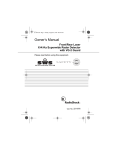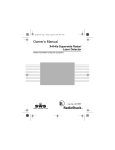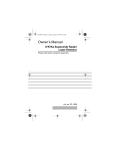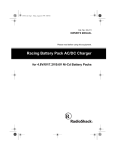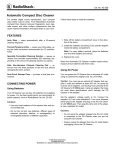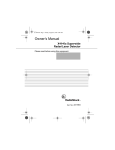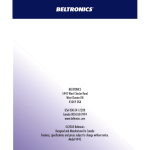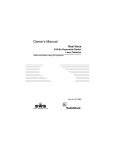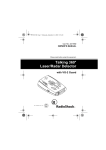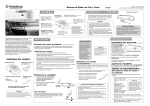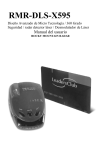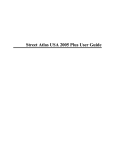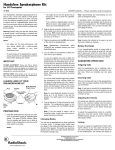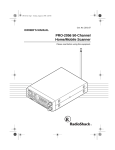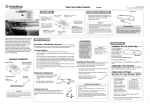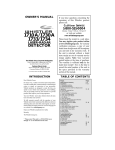Download Radio Shack 22-1670 Radar Detector User Manual
Transcript
22-1670.fm Page 1 Friday, August 6, 1999 10:17 AM Owner’s Manual Cat. No. 22-1670 X•K•Ka Superwide Radar/ Laser Detector with Text Display Please read before using this equipment. 22-1670.fm Page 2 Friday, August 6, 1999 10:17 AM FEATURES Your RadioShack X•K•Ka Superwide Radar/Laser Detector with Text Display alerts you to all known police traffic radar and laser systems. It receives X-, K-, and Ka-band traffic radar signals and also detects the instant-on and laser systems many police departments now use. Plus, a high-contrast text display confirms alerts and feature selections, and alerts you to road hazards signaled by a Safety Warning System signal. Your detector has FAST (False Alert Suppression Technology) circuitry that helps prevent false alarms caused by signals from other radar detectors, without reducing your detector’s sensitivity to traffic radar signals. Note: Some areas have laws regulating the use of radar detectors. Check with your local law enforcement agency about the laws in your area. We recommend that you record your detector’s serial number here. The number is on the detector’s bottom panel. Serial Number: ______________________________ 1996 Tandy Corporation. All Rights Reserved. FAST is a registered trademark and RadioShack is a trademark used by Tandy Corporation. InstaClear is a registered trademark used by Ford Motor Company. ElectriClear is a registered trademark used by Libbey, Owens, Ford, and Delco-Remy. Safety Warning System and SWS are trademarks of Safety Warning System L.C. Patents Pending. 2 22-1670.fm Page 3 Friday, August 6, 1999 10:17 AM Your detector has many useful features, including: Text Display — displays messages and settings. Safety Warning System (SWS) — alerts you to the presence of potential road hazards and emergency vehicles signalled by a safety radar transmission. VG-2 Protection — makes your detector invisible to the VG-2 radar-detector detector when it senses VG-2 operation. X-, K-, Ka-Band, and Laser Signal Detection — warns you when it detects signals from traffic radar or laser devices. Different tones sound to let you know the type of signal received. Front- and Rear-Looking Laser — detects laser signals from both the front and the rear of your vehicle. City/Highway Modes—let you reduce unwanted Xband alerts without affecting the detector’s response to other signals while you are in the city. Your radar/laser detector includes the following items: • Visor Bracket • Windshield Bracket with Suction Cups • Owner’s Manual and Questions and Answers Booklet • Hook and Loop Fastener • Power Cord with 12-Volt Cigarette Lighter Plug • Spare Fuse 3 22-1670.fm Page 4 Friday, August 6, 1999 10:17 AM CONTENTS A Look at the Detector . . . . . . . . . . . . . . . . . . . . . . 5 Installation . . . . . . . . . . . . . . . . . . . . . . . . . . . . . . . . 7 Mounting Guidelines . . . . . . . . . . . . . . . . . . . . . 7 Mounting . . . . . . . . . . . . . . . . . . . . . . . . . . . . . . 8 Hook-and-Loop Mounting . . . . . . . . . . . . . . 8 Visor Mounting . . . . . . . . . . . . . . . . . . . . . . 9 Windshield Mounting . . . . . . . . . . . . . . . . 10 Connecting Power . . . . . . . . . . . . . . . . . . . . . . 12 Operation . . . . . . . . . . . . . . . . . . . . . . . . . . . . . . . . Turning the Detector On and Off . . . . . . . . . . . Adjusting the Volume . . . . . . . . . . . . . . . . . . . . Selecting the City and Highway Modes . . . . . . Dimming the Display . . . . . . . . . . . . . . . . . . . . Audio Modes . . . . . . . . . . . . . . . . . . . . . . . . . . Turning On Safety Warning System and VG-2 Detection . . . . . . . . . . . . . . . . . . . . . Receiving and Identifying Radar, Laser, and Safety Warning System Signals . . . . . . . . Demonstrating Features . . . . . . . . . . . . . . . . . Resetting the Detector . . . . . . . . . . . . . . . . . . . 13 13 13 14 14 15 15 16 18 18 Troubleshooting . . . . . . . . . . . . . . . . . . . . . . . . . . 19 Replacing the Fuse . . . . . . . . . . . . . . . . . . . . . . . . 21 Patents . . . . . . . . . . . . . . . . . . . . . . . . . . . . . . . . . . 22 4 22-1670.fm Page 5 Friday, August 6, 1999 10:17 AM A LOOK AT THE DETECTOR 8 9 7 10 6 1 2 5 3 4 1 P/V (Power/Volume) Button — turns the detector on and off and lets you adjust the volume. 2 Text Display — shows you which modes are selected (BRIGHT, DARK, or DIM, CITY or HIGHWAY, and AUTOMUTE or AUTO off), confirms radar and laser detection by identifying the band and indicating the signal strength, and displays SWS messages. 3 DRK (Dark) Button — lets you dim or darken the display for discreet or night travel. 4 AUD (Audio) Button — provides automatic and manual muting of traffic radar and manual muting of Safety Warning System alerts. 5 CTY (City) Button — switches between the city and highway modes. 5 22-1670.fm Page 6 Friday, August 6, 1999 10:17 AM 6 Speaker — sounds all audible alerts. 7 Antenna Opening — receives radar and Safety Warning System signals. 8 Mounting Bracket Slot Cover — remove to install the supplied mounting bracket. 9 Laser Sensors — pick up laser signals from both the front and rear of your vehicle. 10 Power Jack — the power cable plugs in here. 6 22-1670.fm Page 7 Friday, August 6, 1999 10:17 AM INSTALLATION MOUNTING GUIDELINES Follow these guidelines when selecting a location. • Choose a location that does not block the driver’s view of the road. • Mount the detector in a level position with a clear view to both the front and rear. • Since signals are blocked by metal surfaces, the detector’s view of the road must not be blocked. • Some vehicles have InstaClear‚ or ElectriClear‚ defogging windshields, which have metal coatings that block signals. General Motor’s APV vans have a solar shield that keeps the vehicle cooler during the summer. This shield also blocks signals. A detector installed in a vehicle with any of these features will probably not detect a signal. • Since window tinting reduces the received strength of laser signals, you should not mount the detector behind any tinted glass. • Do not mount the detector where the driver or a passenger might hit it in a sudden stop or accident. Caution: Whichever mounting method you choose, place the detector out of view when you leave the vehicle. This keeps the detector out of sight of thieves and prevents exposing it to extremely high temperatures, which can damage the radar detector. 7 22-1670.fm Page 8 Friday, August 6, 1999 10:17 AM MOUNTING Hook-and-Loop Mounting For some dashboards, the hook-and-loop tape included with your detector might be best for mounting. Follow these steps to use the hook-and-loop tape. 1. Use a damp cloth to clean the bottom of the detector and the dashboard. Let both surfaces dry. Note: The tape’s adhesive might not stick to a surface treated with vinyl cleaner or protectant. 2. Remove the tape’s backing and stick the tape to the bottom of the detector. Note: Do not place the hook-and-loop tape over the detector’s serial number or battery compartment cover. On a curved dashboard, cut the supplied strip in half and use one strip on each side of the bottom of the detector. 3. Remove the backing from the other side of the tape and press the detector onto the dashboard. 8 22-1670.fm Page 9 Friday, August 6, 1999 10:17 AM Visor Mounting The supplied sun visor clip lets you quickly mount the detector on your vehicle’s sun visor. Warning: Do not visor mount the detector if this places the detector near the driver’s or a passenger’s head. Follow these steps to use the sun visor clip. 1. Remove the cover by pressing its raised dots and pushing out. Store the cover in a safe place. 2. Slightly open the visor clip, then slide it onto the top of the detector until it snaps into place. 3. Clip the detector to the edge of the sun visor nearest the windshield. 9 22-1670.fm Page 10 Friday, August 6, 1999 10:17 AM Windshield Mounting The supplied suction-cup mount lets you mount the detector on the windshield. Caution: Do not use the suction-cup mount in a vehicle that has a plastic coating on the windshield designed to protect passengers during an accident. If you use the suction-cup mount on this type of windshield, you might permanently mar the windshield’s surface. 1. Remove the cover by pressing its raised dots and pushing out. Store the cover in a safe place. 2. Align the groove in each suction cup with the slots in the bracket and slide the suction cups out until they lock into place. Then press the rubber cushions onto the metal tips. Finally, screw the base plate onto the bracket through the threaded dowel, but do not tighten the screw. Rubber Cushions Suction Cups Bracket Base Plate Screw 10 Threaded Dowel 22-1670.fm Page 11 Friday, August 6, 1999 10:17 AM 3. Clean the selected windshield area, position the suction-cup mount on the windshield, and press firmly on each suction cup to secure it into place. 4. Adjust the suction-cup mount until the base plate is level, then fully tighten the screw securing the base plate. 5. Slide the detector onto the base plate until it snaps into place. To remove the suction-cup mount from the windshield, lift up on the tab on each cup to release the suction. 11 22-1670.fm Page 12 Friday, August 6, 1999 10:17 AM CONNECTING POWER Caution: Unplug the power cord’s cigarette-lighter plug from your vehicle’s cigarette-lighter socket when you turn off the ignition. This prevents your vehicle’s battery from being drained if you leave the detector on when you turn off the ignition. Plug the supplied power cord’s short barrel plug into the detector’s power jack and the longer barrel plug into the cigarette-lighter plug. Then plug the cord’s cigarettelighter plug into your vehicle’s cigarette-lighter socket. Note: If the detector does not operate when you turn it on, remove the cigarette-lighter plug from your vehicle’s socket and check the socket for debris. Also check the fuse in the cigarette-lighter plug and your vehicle’s fuse block (see “Replacing the Fuse” on Page 21). 12 22-1670.fm Page 13 Friday, August 6, 1999 10:17 AM OPERATION TURNING THE DETECTOR ON AND OFF To turn on the detector, tap P/V. The detector sounds a distinctive tone and displays a text message for each band as a self test (laser, Ka, K, X, and Safety Warning System, in order), then the detector displays the status of the Safety Warning System and VG-2 features. After the self test, the detector displays either CITY or HIGHWAY, whichever mode you last selected. To turn off the detector, tap P/V again. ADJUSTING THE VOLUME To increase the detector’s volume, hold down P/V. The detector sounds tones and displays the volume level (Level 5 is the loudest, 1 is the softest). Release P/V when you hear the desired volume level. To reduce the the volume, release and immediately hold down P/V again. 13 22-1670.fm Page 14 Friday, August 6, 1999 10:17 AM SELECTING THE CITY AND HIGHWAY MODES In the city mode, the detector requires a stronger Xband signal before it sounds an alert. This eliminates responses to most false sources, such as automatic door openers and alarm systems. However, the signal strength meter continues to react immediately to Xband signals to keep you quietly informed. The city mode has no effect on K, Ka, instant-on X, laser, or Safety Warning System signals. To select the city mode, press CTY until the detector displays CITY. The highway mode provides maximum sensitivity for open-road driving. To select the highway mode, press CTY until the detector displays HIGHWAY. DIMMING THE DISPLAY To dim the display, press DRK once. The detector beeps and displays DIM. To turn off all indicators, press DRK again. The detector beeps and displays DARK for a couple of seconds, then the display turns off (H for highway or C for city remains on very dimly to confirm the detector is on). To restore full brightness, press DRK again. The detector beeps and displays BRIGHT for a few seconds, then displays CITY or HIGHWAY. 14 22-1670.fm Page 15 Friday, August 6, 1999 10:17 AM AUDIO MODES While the detector is sounding a radar or Safety Warning System alert, you can press AUD to temporarily silence it. The detector returns to normal operation after the radar signal stops. You can change the alert pattern to sound several X-, K-, or Ka-tones followed by muted clicking by pressing AUD when no alert is sounding. The detector briefly displays AUTOMUTE. The clicking becomes more rapid as the radar signal strength increases. Press AUD again to return to normal operation. The detector briefly displays AUTO off. Note: Laser alerts are not affected by the audio modes. TURNING ON SAFETY WARNING SYSTEM AND VG-2 DETECTION You can turn the Safety Warning System and VG-2 detection on and off to suit your needs. Follow these steps to change these features. 1. With the detector off, press and hold CTY, then press P/V. The detector beeps and briefly displays FEATURES. Then the detector either displays SWS on or flashes SWS off. 2. Press AUD to change the SWS setting. 15 22-1670.fm Page 16 Friday, August 6, 1999 10:17 AM 3. Press CTY. The detector either displays VG-2 on or flashes VG-2 off. 4. Press AUD to change the VG-2 setting. 5. Press P/V to save your settings. The detector displays exit and is then ready for operation. RECEIVING AND IDENTIFYING RADAR, LASER, AND SAFETY WARNING SYSTEM SIGNALS When you turn on your detector, it sounds alert tones in the following order: laser, Ka, K, X, and Safety Warning System. Your detector displays the band and gives different audible alerts for each signal. In addition, the alert tone pulse rate increases and the detector displays more segments in its signal strength meter as the signal gets stronger. When your detector senses instant-on radar, it sounds an intense, 3-second X, K, or Ka burst and flashes the received band and a full signal strength meter. When your detector senses a VG-2 radar-detector detector, it sounds a 3-second warning and displays VG2alert RADAR MAY BE IN USE for the duration of the alert. 16 22-1670.fm Page 17 Friday, August 6, 1999 10:17 AM Notes: • Your radar detector does not respond to any radar source during a VG-2 alert, but laser alerts are not affected. • You must turn on VG-2 detection to receive VG-2 alerts. See “Turning On Safety Warning System and VG-2 Detection” on Page 15. When your detector senses a Safety Warning System transmitter, it sounds a 3-second alert and displays the introductory category followed by one of 58 text messages. Refer to the separate list of alerts to see the five different Safety Warning System categories and their corresponding messages. Introductory Words Hazard Hwy Work Highway construction/maintenance. HazdZone Highway hazard zone advisory which indicate a possible road hazard. Weather Weather hazard such as fog. TravInfo Moving Travel information. Emergency or slow moving vehicles. Incomplete or unknown mes- MessageUnknown sage received. 17 22-1670.fm Page 18 Friday, August 6, 1999 10:17 AM Notes: • Messages are numbered from 1 to 64, but 6 messages are not currently used. • You must turn on Safety Warning System detection and Safety Warning System transmitters must be in use to receive Safety Warning System alerts. See “Turning On Safety Warning System and VG-2 Detection” on Page 15. DEMONSTRATING FEATURES To demonstrate alerts, with the detector off, hold down AUD and CTY. The detector displays TUTORIAL, then demonstrates all audio alerts and displays the corresponding band. It then demonstrates the signal strength meter, a VG-2 alert, and three sample SWS messages. To end the tutorial, press P/V. To see all 58 SWS messages, press CTY during a sample SWS message. The detector displays MSG and the current message number. To see this message, press AUD . To advance to the next message, press CTY. If you do not press a button within 3 seconds, the detector resumes its demonstration. RESETTING THE DETECTOR To reset the detector to its defaults, with the detector off, hold down AUD, then press both CTY and P/V . The detector displays RESET and beeps twice. 18 22-1670.fm Page 19 Friday, August 6, 1999 10:17 AM TROUBLESHOOTING If you have problems operating your radar/laser detector, the suggestions in this section might help. If you cannot solve the problem after trying these suggestions, take your detector to your local Radio Shack store for assistance. If the detector does not turn on: • Be sure all power connections are secure. • Check the fuse that controls power to the cigarettelighter socket. See your vehicle’s owner’s manual. • Check the fuse in the cigarette-lighter plug. See “Replacing the Fuse” on Page 21. • The cigarette-lighter socket might be dirty. Clean it to give a good, clean connection. Caution: Do not place any metal object other than the cigarette lighter or a cigarette-lighter plug in the cigarette-lighter socket. Doing so could blow a fuse in your vehicle or cause the metal object to become very hot. If the detector gives a false alert when the vehicle hits bumps in the road: • Check the power connections. 19 22-1670.fm Page 20 Friday, August 6, 1999 10:17 AM If the detector gives a false alert when you use accessories such as power windows, motorized mirrors, brakes, and so on: • Check the vehicle’s electrical system, including the main battery cable and alternator connections. • Install a filter capacitor (1,000 µf, 35 volts, such as Cat. No. 272-1032) on the back of the cigarettelighter socket, across the power connections. If the detector performs the self-test, but does not respond to radar signals when you see a police car: • A police car might not be equipped with radar, or might be using instant-on radar and not have the radar gun triggered (see the separate booklet Questions and Answers About Vehicle Speed Detection). • Police might be using VASCAR-type speed detection (see the separate booklet Questions and Answers About Vehicle Speed Detection). If the detector has poor laser detection range: • Be sure the laser detection lenses are not blocked. • Use lens-cleaning solution to clean the laser detection lenses and the windshield. • Be sure the detector is not mounted in front of window tinting. 20 22-1670.fm Page 21 Friday, August 6, 1999 10:17 AM REPLACING THE FUSE If the detector stops operating, check the fuse in the DC power cord’s cigarette-lighter plug. If it has blown, follow these steps to replace it. 1. Carefully unscrew the tip of the cigarette-lighter plug. Fuse Holder Tip 2. Remove the tip from the cigarette-lighter plug, then remove the old fuse. Note: The tip is in two pieces. Take care not to lose either piece or the spring inside the holder. 3. Replace the fuse with a 1-Amp, 5 × 20 mm, fast-acting fuse (Cat. No. 270-1049). Caution: Using a fuse that does not meet these ratings or defeating the fuse protection can damage your detector or the vehicle’s electrical system. 4. Press the cigarette-lighter plug’s tip down into the body, then screw it back in. Caution: Be sure you press the cigarette-lighter plug’s tip down before screwing it in, or you might damage the plug. 21 22-1670.fm Page 22 Friday, August 6, 1999 10:17 AM PATENTS This radar/laser detector is protected under one or more of the following patents. United States: 4,571,593 4,630,054 4,961,074 4,952,936 5,402,087 5,446,923 Canada: 1,187,586 1,187,602 1,295,714 1,295,715 Other patents pending. 22 22-1670.fm Page 23 Friday, August 6, 1999 10:17 AM NOTES 23 22-1670.fm Page 24 Friday, August 6, 1999 10:17 AM RadioShack Limited Warranty This product is warranted against defects for 1 year from date of purchase from RadioShack companyowned stores and authorized RadioShack franchisees and dealers. Within this period, we will repair it without charge for parts and labor. Simply bring your RadioShack sales slip as proof of purchase date to any RadioShack store. Warranty does not cover transportation costs. Nor does it cover a product subjected to misuse or accidental damage. EXCEPT AS PROVIDED HEREIN, RadioShack MAKES NO EXPRESS WARRANTIES AND ANY IMPLIED WARRANTIES ARE LIMITED IN DURATION TO THE DURATION OF THE WRITTEN LIMITED WARRANTIES CONTAINED HEREIN. Some states do not permit limitation or exclusion of implied warranties; therefore, the aforesaid limitation(s) or exclusion(s) may not apply to the purchaser. This warranty gives you specific legal rights and you may also have other rights which vary from state to state. We Service What We Sell 10/95 RadioShack A Division of Tandy Corporation Fort Worth, Texas 76102 8/96 Printed in Canada
























